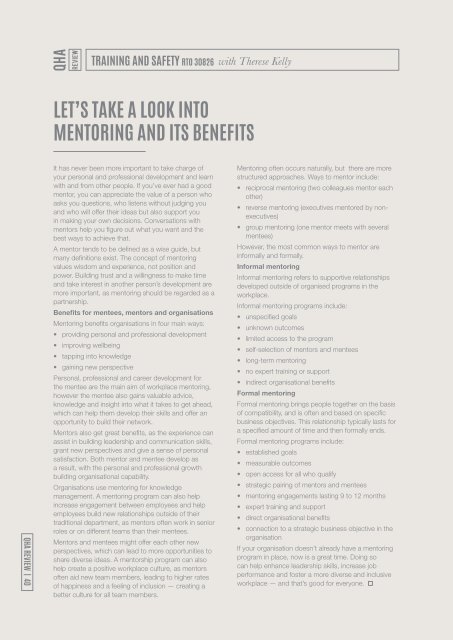QHA-Review_August_Digital
Create successful ePaper yourself
Turn your PDF publications into a flip-book with our unique Google optimized e-Paper software.
TRAINING AND SAFETY RTO 30826<br />
with Therese Kelly<br />
LET’S TAKE A LOOK INTO<br />
MENTORING AND ITS BENEFITS<br />
<strong>QHA</strong> REVIEW | 40<br />
It has never been more important to take charge of<br />
your personal and professional development and learn<br />
with and from other people. If you’ve ever had a good<br />
mentor, you can appreciate the value of a person who<br />
asks you questions, who listens without judging you<br />
and who will offer their ideas but also support you<br />
in making your own decisions. Conversations with<br />
mentors help you figure out what you want and the<br />
best ways to achieve that.<br />
A mentor tends to be defined as a wise guide, but<br />
many definitions exist. The concept of mentoring<br />
values wisdom and experience, not position and<br />
power. Building trust and a willingness to make time<br />
and take interest in another person’s development are<br />
more important, as mentoring should be regarded as a<br />
partnership.<br />
Benefits for mentees, mentors and organisations<br />
Mentoring benefits organisations in four main ways:<br />
• providing personal and professional development<br />
• improving wellbeing<br />
• tapping into knowledge<br />
• gaining new perspective<br />
Personal, professional and career development for<br />
the mentee are the main aim of workplace mentoring,<br />
however the mentee also gains valuable advice,<br />
knowledge and insight into what it takes to get ahead,<br />
which can help them develop their skills and offer an<br />
opportunity to build their network.<br />
Mentors also get great benefits, as the experience can<br />
assist in building leadership and communication skills,<br />
grant new perspectives and give a sense of personal<br />
satisfaction. Both mentor and mentee develop as<br />
a result, with the personal and professional growth<br />
building organisational capability.<br />
Organisations use mentoring for knowledge<br />
management. A mentoring program can also help<br />
increase engagement between employees and help<br />
employees build new relationships outside of their<br />
traditional department, as mentors often work in senior<br />
roles or on different teams than their mentees.<br />
Mentors and mentees might offer each other new<br />
perspectives, which can lead to more opportunities to<br />
share diverse ideas. A mentorship program can also<br />
help create a positive workplace culture, as mentors<br />
often aid new team members, leading to higher rates<br />
of happiness and a feeling of inclusion — creating a<br />
better culture for all team members.<br />
Mentoring often occurs naturally, but there are more<br />
structured approaches. Ways to mentor include:<br />
• reciprocal mentoring (two colleagues mentor each<br />
other)<br />
• reverse mentoring (executives mentored by nonexecutives)<br />
• group mentoring (one mentor meets with several<br />
mentees)<br />
However, the most common ways to mentor are<br />
informally and formally.<br />
Informal mentoring<br />
Informal mentoring refers to supportive relationships<br />
developed outside of organised programs in the<br />
workplace.<br />
Informal mentoring programs include:<br />
• unspecified goals<br />
• unknown outcomes<br />
• limited access to the program<br />
• self-selection of mentors and mentees<br />
• long-term mentoring<br />
• no expert training or support<br />
• indirect organisational benefits<br />
Formal mentoring<br />
Formal mentoring brings people together on the basis<br />
of compatibility, and is often and based on specific<br />
business objectives. This relationship typically lasts for<br />
a specified amount of time and then formally ends.<br />
Formal mentoring programs include:<br />
• established goals<br />
• measurable outcomes<br />
• open access for all who qualify<br />
• strategic pairing of mentors and mentees<br />
• mentoring engagements lasting 9 to 12 months<br />
• expert training and support<br />
• direct organisational benefits<br />
• connection to a strategic business objective in the<br />
organisation<br />
If your organisation doesn’t already have a mentoring<br />
program in place, now is a great time. Doing so<br />
can help enhance leadership skills, increase job<br />
performance and foster a more diverse and inclusive<br />
workplace — and that’s good for everyone.
















